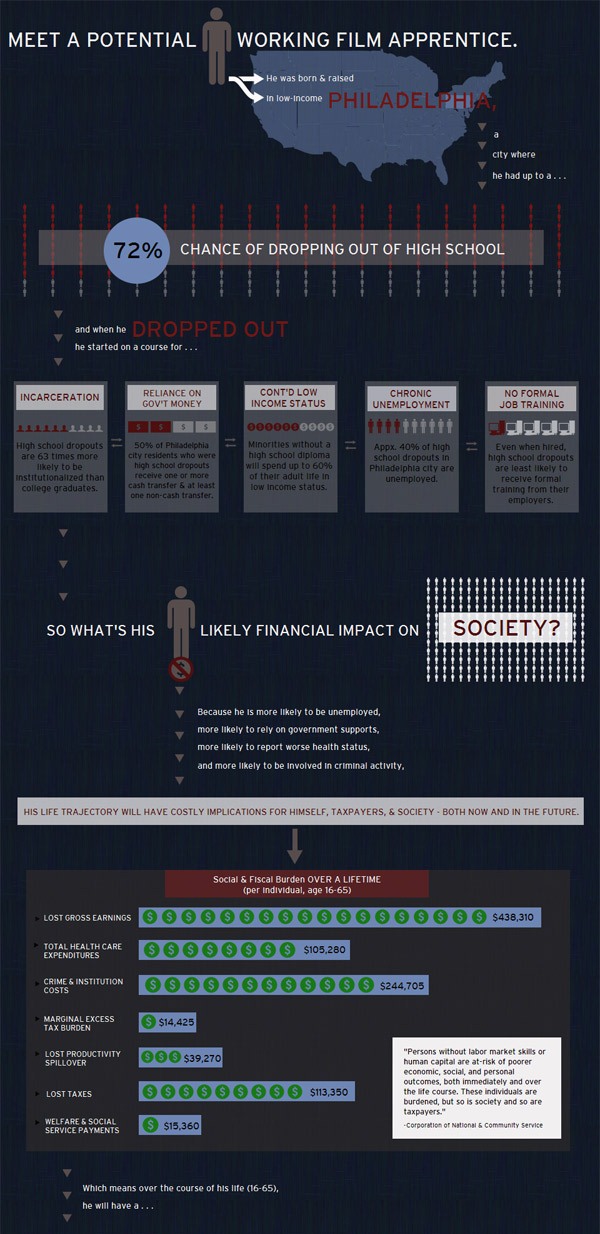Ricky Staub and Anders Lindwall were on a steady path to success in the film industry. Ricky was working for a big producer and Anders was freelancing as a commercial director. Then, God called both of them to leave their jobs and start a company of their own — one focused on leveraging the process of filmmaking toward whole-life transformation for adults in recovery.
http://vimeo.com/31101638
Creating a unique business model founded on a concept called “family ratios,” NFCo melds for-profit with non-profit to train, mentor, and employ adults in recovery, a group they felt was particularly marginalized and left with few opportunities. Founding a separate non-profit called Working Film Establishment to serve as “a training ground to prepare adults in recovery for thriving employment,” Ricky and Anders now use NFCo as a for-profit wing for employing newly trained workers to “create content as a means of restoration, dignity, and hope.” As the above video notes, “in 2014, NFCo plans to enter into production on their first feature film with an entire crew recovering from homelessness, addiction, or incarceration.”
The founders of NFCo have followed the call of God on their lives, and through their daily work are actively impacting culture, the arts, and the economy through community-building, one-on-one discipleship, and creative output. Though it can be tempting for us to take the work we have for granted, NFCo offers a clear example of how God uses entrepreneurship and business to lift people up, transform relationships, and contribute to the common good.
Ricky and Anders were kind enough to share more about their story with On Call in Culture and discuss the ways God continues to use NFCo to impact the lives of others. To find out more about Neighborhood Film Company, visit their website. To donate to Working Film Establishment, click here.
—
What were your careers like before Neighborhood Film Company? What did you leave behind to start the company and why?

I (Ricky) was working for film producer, Sam Mercer. I did that for four years. In a lot of ways, it was my dream job. I was working on huge films, learning a ton, and there were endless opportunities to grow career-wise. The main catalyst for my leaving was when I began to take my faith seriously. I had come to a point during my time working with Sam where I inventoried my faith and asked, “Why do I believe this?” My faith at that time could really be boiled down to me being a really nice person who didn’t drink, smoke, and felt bad when I swore too much. At an intellectual level, I knew that Christ must have died for more than that.
So I decided to test the Bible’s truth, to take it for face value and read it myself. I was either going to be a Christian or abandon my faith…So I started with the poor. I was working on a film in Philadelphia at the time, so I started by making lunches and taking them to people on the street and eating lunch with anyone I could meet. This really was the genesis of my transformation. I started to understand the life of scripture in a whole new way. But mostly, my desires changed. I found myself haunted by the hours I spent at work while I knew that if I had more time I could actually do something to help these men and women who had become my friends. Neighborhood Film Company was never a created to be “innovative” or out of a desire to start my own business. It was and still is purely motivated toward experiencing God at work — to be a part of his work.

I (Anders) was freelancing around the globe as a commercial director. I found myself in other countries making videos for great organizations with great missions and yet something was off. A defining moment happened while filming a commercial in a township in South Africa. A woman came up to me and asked for help with her house that was falling down. Noticing my camera, she pleaded that I make a video and send it back to the states so my friends could ship money to fix her roof. Her awareness to the traditional cycle of non-profit filmmaking was astounding. I was overwhelmed by two options: (1) Make another inspiring video, or (2) roll up my sleeves and build the roof myself. Instead, I chose a third option: I walked away sad, knowing that for me to actually give myself to this woman, to just build the roof myself, demanded so much more from me. To act in a manner of that type of service, my life would be seriously interrupted. When I looked at the calling of the disciples, Jesus wasn’t searching for weekend volunteers. He was looking for radical abandonment. For too long I had only been a volunteer with my free time. I wanted so badly to find a way to fix that disconnection in my life. This company is an expression of that. It is designed to have our work be interruptions.
What led you to focus specifically on hiring adults in recovery?
It was because of the friends we had who were adults in recovery — those we had met on the streets. Also, there are so many opportunities and avenues for teens coming out of poverty, but very few, if any, substantial opportunities for adults who are either too old or have exhausted too many options. We believe it makes us depend on the Lord even more and hope in his promise — that even the least, last, and fully broken are not outside the realm of transformation. The stakes are higher.
When we looked at the gospels, we saw people desperate — for hope, for healing, and for the chance to be free. That type of hunger that is attractive to our company.
In the video on your website, you describe NFCo as taking a “holistic” approach — how you live together and work together. Describe the community dynamic of NFCo and how it impacts your business day to day.

We have a concept called “family ratios.” We’ve created a model for our relationships with professionals and apprentices in our company. Apprentices are the individuals in recovery who are training at our company. A traditional social work model has one case manager for every 40+ residents. This ratio makes no sense to us.
We look at the family ratio: one to two parents for one to five kids on average. You’d never see one parent for 40 kids. There is no way anyone could be loved that way. Therefore, we flip the standard: three apprentices surrounded by 10+ professionals, and we pour way more time and money into their development and support. We treat our apprentices as if they are actual family, constantly asking, “If this were my son or brother, how would I respond?”
We believe that someone in recovery at age 40 still has the same power to compete at a professional level as someone at age 25 who grew up in a fully supported family of parents, friends, coaches, etc. But this is only possible if that person in recovery is given a new family that has the highest belief in and expectations for them.
You can see more on this model here. It’s an infographic we created that’s been published.
How have the economics worked out when it comes to hiring inexperienced adults in recovery? Has it been a cost that you simply accept? A long-term investment?
It’s absolutely long-term. And it’s a patient process. But what’s surprising is that the right people in recovery actually have a beautiful wealth of knowledge, experience, and determination. You can’t manufacture the type of drive they have to see their lives change. But it’s not for everyone. We tell every applicant, “We’re not here to babysit you. There are plenty of programs for that. We’re here to walk alongside you in total life redirection and transformation.”
And it makes our work richer and fuller. Every day is an absolute joy to watch someone’s life transform through work and to share that with clients. I’d argue that our work has gotten better because of the heart of our process.
What’s your favorite story about the way NFCo has transformed the lives of others?
Elliott was our first employee. You’ve probably seen him if you watched our promo video. We took a job shooting for a local academy in a city called Spruce Hill. The job was low paying and, quite honestly, we really didn’t want to do it. But they were persistent that we shoot the video, so we finally gave in. Elliott shot at the school for over a week and garnered a fantastic working relationship with the headmaster. Elliott also has a daughter, Kiyanna, who at the time was seven years old and had never been in school. That’s first grade level!
Obviously, this was a huge problem and an emergency. Elliott leveraged his new relationship with the headmaster and talked them into giving Kiyanna a scholarship to the school. Then, as a company, we provided transportation to the school. We took turns as a company giving her a ride since they didn’t have a bus yet for her area. We also hired a tutor to work with her after school to get her back up to speed.
We love this story for a couple reasons. First, Elliott got his life back on track by working with us. And his stability was able to make him look at those in his circle that he loved and asked, “Now how do I help them?” It would be hard to quantify this effect. Kiyanna’s entire life could be changed because of this.
Second, the way we as a company could support Elliott and his family through rides, tutoring, advocacy, etc., was significant because he was one surrounded by many. Without this ratio, he and his daughter would fall through the cracks. Quite frankly, they had. But we love Elliott as family and family doesn’t allow stuff to slip. And we can care that deeply because of the ratio that we keep.
—
To find out more about Neighborhood Film Company, visit their website. To donate to their non-profit, Working Film Establishment, click here.
To join the On Call in Culture community, like us on Facebook or follow us on Twitter.


